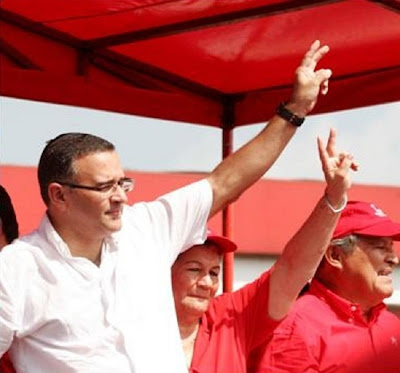El Salvador’s Left Turn?
 Mixed results for ‘el frente’ in the country’s congressional elections.
Mixed results for ‘el frente’ in the country’s congressional elections.By Jacob Wheeler*
The day after the U.S. presidential election, Salvadoran presidential candidate Mauricio Funes congratulated President Obama.
“These winds of change have begun to blow from the United States to refresh the global atmosphere, in need of more democracy and greater social justice,” Funes said in a statement. “The Americans have not been afraid to choose change, as they have staked out the future and not the immobility of the past.”
Funes, who himself is on a nationwide “Caravan of Hope” tour, is the new face of the Faribundo Marti National Liberation front (FMLN). The party—born from five bands of leftist guerrillas during El Salvador’s civil war from 1980 to 1992—is on the verge of winning its first presidential election on March 15.
A popular former TV journalist, Funes enjoys a double-digit lead—as high as 17 percentage points, according to one December poll—over his opponent, Rodrigo Avila of the incumbent right-wing National Republican Alliance (ARENA) party, which has held the presidency for 20 years.
Despite Funes’ poll numbers, the FLMN received mixed results in the national assembly elections on Jan. 18. El frente (or “the front”) as the party is known in El Salvador, gained three seats, giving it 35 out of a total 84. Meanwhile, ARENA lost two seats to give it 32. But the conservative Party of National Conciliation (PCN) won 11 seats, continuing the right-wing coalition’s legislative majority.
FMLN won the mayors’ offices in three other large cities in El Salvador—Soyapango, Santa Tecla and Santa Ana—and increased the number of municipalities it will govern by 90 percent. But the party lost the mayor’s seat in San Salvador, the capital, which incumbent Violeta Menj’var had held since 2005. FMLN had controlled the capital as a strategic stronghold for the past 12 years.
Evidence of possible voter fraud surfaced during the election. FMLN representatives, and groups such as the Committee in Solidarity with the People of El Salvador (CISPES), reported that buses of Guatemalan, Honduran and Nicaraguan nationals were detained in border provinces, allegedly on their way to the capital to vote for ARENA. Others, the opposition fears, may have gotten through. CISPES Executive Director Burke Stansbury also believes that ARENA brought rural Salvadorans into the capital to tip the balance there.
As the incumbent party, ARENA controls access to the citizen registry and, before the election, it prevented FMLN and outside observers from comparing the registry to voter rolls.
But Geoff Thale of the Washington Office on Latin America says he doubts that alleged voter fraud made a difference in the capital.
“Violeta Menj’var lost San Salvador because the party was overconfident and failed to run a strong campaign [and] because the mayor’s record in office wasn’t that impressive in terms of municipal services and city management,” Thale says. “Violeta’s predecessors were viewed as effective managers; she wasn’t.”
Thale adds that ARENA presidents have made life difficult for FMLN mayors of San Salvador, “squeezing them on budget issues and being uncooperative on issues like garbage disposal and dump sites.”
Tim Muth, who runs a popular blog called Walking with El Salvador, says the mixed results from the Jan. 18 election may shows signs of a maturing democracy.
“What happened in San Salvador is that a certain portion of the voters appeared to split their votes on National Assembly and mayor,” Muth wrote on his blog. “They were voting based on who they thought (rightly or wrongly) was the best able to govern, rather than voting strictly on party lines.”
FMLN’s motto on Funes’ Caravan of Hope tour has been “Nace la esperanza, viene el cambio” (Hope is born, change is coming). While el frente didn’t expect citizens to actually vote for change in San Salvador’s mayoral election, the party expects its biggest victory to come on March 15.
If poll numbers hold in Funes’ favor, another Latin American democracy will turn to the left.
SOurce: In These Times 7/3/2009













Ya no queda otra alternativa en estor paise que hemos sido explotados por los oligarcas y por los gringos; aqui, la unica manera de quebrar las nefastas administraciones areneras es votando por la izquierda. Todos los otros partidos politicos tienen nexos de subyugamiento y hasta de ser titeres del partdo oficial ARENA,sacandole tambien ellos provecho al sistema corrupto que mantendra ARENA eternamente.
ReplyDeletepor eso nuestra unica esperanza es Mauricio Funes, no el partido de izquierda que representa, en el depositamos toda nuestra fe y confianza para que en este pais haya paz, justicia social y prosperidad para todos, incluso para los ricos, que ya no van a robar ni corromper al gobierno liderado por Funes.
Mr. Wheeler is right in tis analisis of the Salvadoran election times.
ReplyDeleteOne thing importan of real relevance is THE FACT TAHT if Funes win the Eletoral vote by March 15, the imprtance is not to belong to the left, BUT TO THE SALVADORAN PEOPLE !
Jose Matatias Delgado Y Del Hambre.
CORRECTION
ReplyDeleteMr. Wheeler is right in his analisis of the Salvadoran election times.
One thing importan I tough, is of real relevance THE FACT THAT if Funes win the Electoral vote by March 15, the importance is not to belong to the left,
BUT TO THE SALVADORAN PEOPLE !
Jose Matatias Delgado Y Del Hambre.